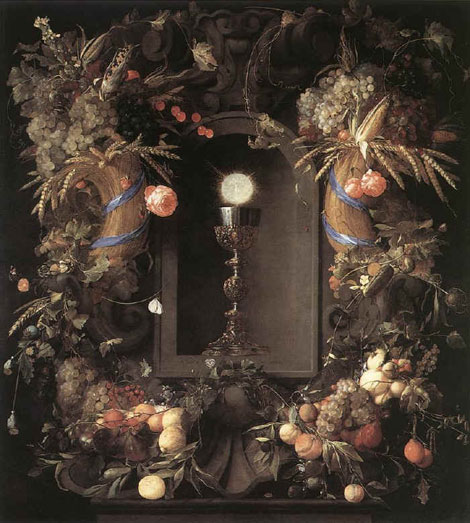Corpus Christi
Feast of Corpus Christi
“My flesh is meat indeed, and My Blood is drink indeed. He that eateth my flesh and drinketh my blood, abides in me, and I in him. As the living Father hath sent me, and I live by the Father, so he that eateth Me, the same also shall live by me. This is that bread that down from Heaven. Not as your fathers did eat manna and are dead. He that eateth of this Bread shall live forever.“
-John 6:56-59-

Ten times in John’s gospel, Christ insists that we eat His Flesh and drink His Blood. And He let people walk away when they took Him literally. They said, “That’s too much for us. We’re not having any of that.” And they left, and He let them leave. We have many places in the Gospels where if there is a misunderstanding, Christ corrects that misunderstanding. There was no ambiguity when Christ said that we must eat His flesh and drink His Blood. He knew what He was saying, and He meant what He said, and He allowed those who did not believe Him to walk away.
To resist the attacks of continually renewed heresies against the Holy Eucharist and to revive in the Church a fervor which had somewhat grown cold, the Holy Ghost inspired, at the beginning of the thirteenth century, the solemnity of Corpus Christi
In 1208 blessed Juliana of Mount Cornillon, near Liege, saw in a vision the full moon with an indentation indicating that a feast was missing in the liturgical cycle. The Eucharist instituted on Maundy Thursday, could not be celebrated with all the desired pomp, the Church’s thoughts being absorbed by the passion of the Savior. It was necessary and immediately after Paschaltide a feast with an octave should be established. And as the Last Supper had taken place on a Thursday, the Bishop of Liege instituted in 1246 this solemnity in his diocese on the first free Thursday after the octave of Pentecost. In 1264, Pope Urban IV extended this feast to the whole world.
The Eucharist instituted on the eve of Jesus’ death, remains the memorial of His passion (Collect). The altar is the continuation of Calvary, “the Mass announces the death of the Lord” (Epistle). Jesus is there as a victim, for the words of the double consecration tell us that it is the bread which is first changed into the Body of Christ, and then the wine into His blood: under these appearances, Jesus Himself offers to His Father, at the same time as His priests, the Blood which He shed and His Body which was nailed to the Cross.
One takes part in the sacrifice by eating of the victim: Eucharist was instituted in the form of food (Alleluia) so that we may receive in Communion the victim of Calvary. The Sacred Host has become wheat which nourishes our souls” (Introit).
The Mass is the center of the whole Eucharistic worship of the Church, and Holy Communion is the means instituted by Jesus to enable us to participate more fully in this divine sacrifice.